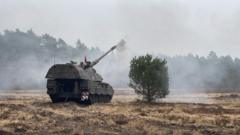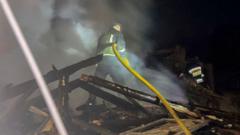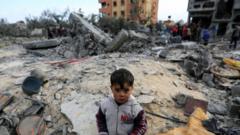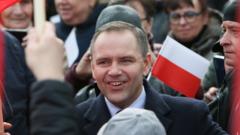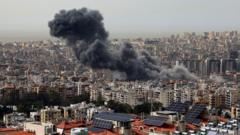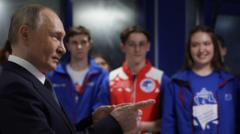In a recent statement, Vladimir Putin proposed a temporary UN-led administration in Ukraine to facilitate the election of a new government, which he argues would lead to credible peace negotiations. Contrarily, the Ukrainian government denounces the idea, framing it as a ploy to undermine its legitimacy during the protracted conflict.
Putin Proposes UN Administration for Ukraine Amid Ongoing Conflict
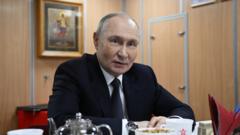
Putin Proposes UN Administration for Ukraine Amid Ongoing Conflict
Russian President Vladimir Putin suggests placing Ukraine under UN control to elect a new government, raising tensions as peace talks continue.
In a striking turn of events amid the nearly four-year-long conflict in Ukraine, Russian President Vladimir Putin has suggested that the United Nations should temporarily assume governance over Ukraine. The proposal aims to facilitate the election of what he termed a "competent" government, implying that current leadership under President Volodymyr Zelensky is lacking legitimacy. This declaration coincides with ongoing international efforts brokered primarily by the United States to establish a ceasefire, raising concerns about Russia's intent and the overall prognosis for peace in the region.
Putin's comments emerged during a speech to members of a nuclear submarine crew in the northern city of Murmansk. He posited that a UN administration could help organize elections, thereby endorsing the formation of a government that would have the trust of the Ukrainian populace. This idea is presented as a pathway toward establishing a credible negotiating position for peace talks, a notion that Ukraine has vehemently dismissed as unrealistic and counterproductive.
The Ukrainian administration has labeled Putin's proposal as "crazy," framing it as a mere tactic to delay substantive progress toward a peace agreement, which has recently been a focal point of discussions led by U.S. President Donald Trump. A spokesperson from the White House proactively reinforced this idea, asserting that the governance of Ukraine would ultimately be determined by its constitution and the will of its people, dismissing Putin's assertions as unfounded.
Ukrainian officials note that Zelensky’s continued leadership is a result of the martial law in effect due to wartime conditions. Holding valid elections now poses significant logistical challenges, with millions of Ukrainians either displaced within the country or abroad. Thus, the Kremlin's push for elections can be interpreted as an attempt to question Zelensky’s status as a legitimate negotiating partner, complicating the landscape for future peace negotiations.
After Putin’s announcement, his spokesperson Dmitry Peskov elaborated that the call for UN oversight was a response to apparent “loss of control” displayed by Kyiv's leadership. Peskov claimed that Ukrainian forces were not adhering to commands but were instead attacking Russian energy infrastructures, despite prior agreements to refrain from such actions.
Meanwhile, Zelensky’s chief of staff Andriy Yermak accused Russia of seeking to prolong the conflict through such proposals while simultaneously escalating military engagement. A national security representative from the U.S. reiterated that the future governance of Ukraine rests with its citizens, thereby skewing the legitimacy narrative that Moscow is attempting to cultivate.
Putin's assertion of having the "strategic initiative" in the conflict further complicates the situation. Despite assurances of military success, reports on the ground indicate limited territorial advances by Russian forces compared to their ambitious claims.
The remarks by President Putin were made against the backdrop of a recent meeting in Paris among Zelensky and European allies, where discussions included assurances for Ukraine from France and the United Kingdom, indicating international support for its sovereignty. The persistent questions surrounding Russia's intentions continue to overshadow peace discussions, as stakeholders navigate the complexities of the ongoing war initiated by Russia's invasion in February 2022.




